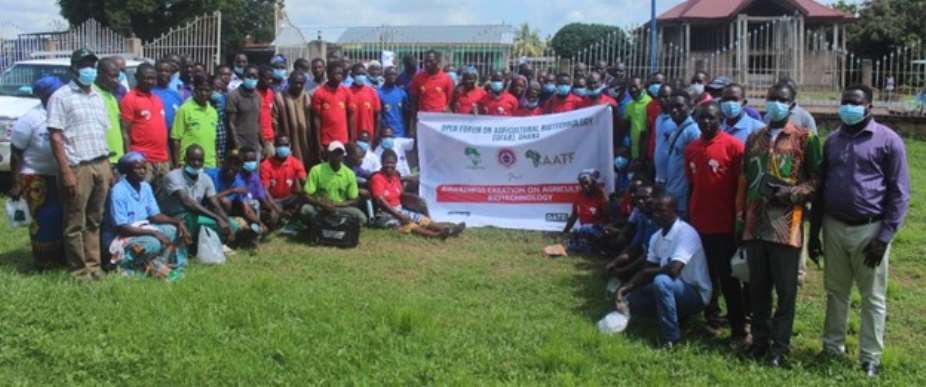More than 200 Ghanaian farmers have expressed their readiness to plant Bt cowpea, Ghana’s first genetically modified food crop as soon as possible.
The crop, which was developed by Ghanaian scientists, has been genetically modified (GM) to resist the destructive pod-borer insect pest. As a result, farmers will be able to significantly reduce the use of pesticides and subsequent increases in yield and income. The crop is also expected to support the nation’s economic development and food security while improving farmers’ livelihoods.
Farmers from the Atebubu-Amantin Municipality of the Bono East Region of Ghana very positive about the technology and say it is good for them. They asked the scientists at CSIR to ensure farmers get the pod borer resistant (PBR) cowpea (GM) Cowpea seeds as soon as possible.
They expressed optimism in the crop at a day’s workshop organized by Open Forum on Agricultural Biotechnology (OFAB), Ghana Chapter.
The purpose was to educate farmers and journalists on biotechnology crops (GM crops) developed in Ghana and its benefits for the country.
Mr Stephen Aidoo, the Municipal Agric Director entreated the farmers and extension officers present to take the knowledge they will acquire seriously since technology drives agriculture. He encouraged the farmers to understand the issues of biotechnology and educate their fellow farmers. He thanked the resource persons from OFAB and CSIR for choosing Atebubu-Amantin for the training on GM Cowpea and asked for another visit.
Dr Daniel Osei Ofosu (National Coordinator Program for Biosafety Systems-PBS) spoke on how Gm crops are developed. He explained that “biotechnology and GM crops are necessary since they provide solutions that conventional breeding cannot achieve”. Adding that “GM technology has been without for years and its application in agriculture is just to develop new crop varieties with traits that solve problems of pests, diseases and drought and so on.”
He said, the GM Cowpea for Ghana is developed to be resistant to the Maruca pest, which can destroy about 80% of the farm.
He predicted that farmers will be receptive to GM cowpea because it reduces pesticide use and increases yields. “Once the farmer starts to use the technology, the consumer will not feel bad about using it,” he added. “So, to me, it’s a win–win.”
Scientists at the state-owned Savannah Agricultural Research Institute (SARI) of the CSIR has officially requested approval from the National Biosafety Authority (NBA) to give farmers access to the GM cowpea beyond the confined research fields where they’re currently grown.
The institute has been working on the GM cowpea variety (Bt cowpea), also known as pod-borer resistant cowpea, for seven years now. The tools of genetic engineering were used to introduce Bt genes that are harmful to the destructive Maruca (pod-borer) pests, but safe for humans, livestock and other non-target insects, into a local variety of cowpea. The resulting variety can help farmers substantially cut down on the use of pesticides.
Dr Richard Ampadu-Ameyaw (National Coordinator OFAB Ghana) who spoke on the socio-economic and environmental benefits of GM crops, explained that “the GM Cowpea in Ghana will reduce the use of pesticides by 80%, this will be beneficial to the environment.”
He explained, “The GM Cowpea being resistant to the Maruca pest prevents loss of about 80% of cowpea harvest thus increasing the output of the farmer. This also saves the farmer cost of buying pesticides. Ultimately, GM Cowpea has so many benefits for the farmer.”





 Avoid pre-registered SIMs, buyer and seller liable for prosecution – Ursula Owus...
Avoid pre-registered SIMs, buyer and seller liable for prosecution – Ursula Owus...
 Election 2024: Mahama has nothing new to offer Ghanaians, Bawumia is the future ...
Election 2024: Mahama has nothing new to offer Ghanaians, Bawumia is the future ...
 OSP files fresh charges against ex- PPA Boss
OSP files fresh charges against ex- PPA Boss
 Withdraw unreasonable GH¢5.8m fine against former board members – ECG tells PURC
Withdraw unreasonable GH¢5.8m fine against former board members – ECG tells PURC
 Akroma mine attack: Over 20 armed robbers injure workers, steal gold at Esaase
Akroma mine attack: Over 20 armed robbers injure workers, steal gold at Esaase
 Those who understand me have embraced hope for the future — Cheddar
Those who understand me have embraced hope for the future — Cheddar
 Ghana will make maiden voyage into space should Bawumia become President — Chair...
Ghana will make maiden voyage into space should Bawumia become President — Chair...
 Train crash: Despite the sabotage, we shall not be deterred and will persevere —...
Train crash: Despite the sabotage, we shall not be deterred and will persevere —...
 Tema-Mpakadan railway project a perversion of the original viable concept design...
Tema-Mpakadan railway project a perversion of the original viable concept design...
 Train crash: Elsewhere, everyone involved in the test will either be fired or re...
Train crash: Elsewhere, everyone involved in the test will either be fired or re...
